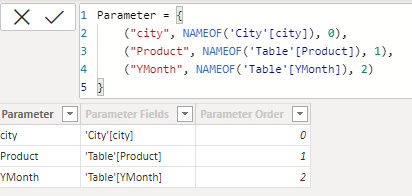
Scenario:
The May 2022 version of Power BI Desktop includes a very interesting and useful feature – Field Parameters. To better help you understand this new function, I would like to generally introduce it and share with you about some common application scenarios.
Introduction
Field: a table column or measure.
Parameters: is a variable.
Field parameters: Field parameters allow users to dynamically change the measures or dimensions being analyzed within a report. We can use the parameter to control the measures or dimensions used in a visual.
The parameter table has three columns, the first is the parameter name, which is the name displayed in the slicer, the second is the field source (measure and column), and the third is the parameter order.
PS: Some people may ask, is it possible to add a field parameter to be blank? Not currently. If we add a blank field, an error occurs when rendering the report.
Steps:
Original Table:
a) Table
|
Date |
sales |
StorelD |
YMonth |
Product |
quantity |
Salemanager |
|
3/1/2022 |
56 |
2 |
2022-3 |
Product6 |
5 |
Amy |
|
4/3/2022 |
40 |
1 |
2022-4 |
Product6 |
10 |
Amy |
|
1/2/2022 |
49 |
3 |
2022-1 |
Product3 |
7 |
Amy |
|
1/22/2022 |
53 |
2 |
2022-1 |
Product4 |
3 |
Amy |
|
2/11/2022 |
52 |
1 |
2022-2 |
Product3 |
5 |
Helen |
|
3/3/2022 |
33 |
1 |
2022-3 |
Product4 |
9 |
Helen |
|
3/23/2022 |
22 |
3 |
2022-3 |
Product5 |
8 |
Helen |
|
4/12/2022 |
27 |
2 |
2022-4 |
Product2 |
6 |
Paul |
|
3/1/2022 |
35 |
1 |
2022-3 |
Product3 |
12 |
Paul |
|
4/3/2022 |
33 |
3 |
2022-4 |
Product5 |
2 |
Paul |
|
1/2/2022 |
57 |
3 |
2022-1 |
Product6 |
5 |
Paul |
|
7/1/2022 |
57 |
1 |
2022-7 |
Product1 |
8 |
Paul |
|
7/21/2022 |
41 |
3 |
2022-7 |
Product3 |
7 |
Paul |
|
3/3/2022 |
43 |
3 |
2022-3 |
Product4 |
9 |
Wendy |
|
3/23/2022 |
42 |
1 |
2022-3 |
Product2 |
3 |
Wendy |
|
4/12/2022 |
47 |
3 |
2022-4 |
Product2 |
4 |
Wendy |
|
3/1/2022 |
25 |
1 |
2022-3 |
Product6 |
6 |
Wendy |
|
4/3/2022 |
37 |
3 |
2022-4 |
Product5 |
5 |
Wendy |
|
1/2/2022 |
53 |
3 |
2022-1 |
Product2 |
3 |
Wendy |
b) City
Scenario 1: Dynamic Coordinate Axis
Click New Parameter > Field, in the pop-up window, all fields in the model can be selected on the right:
When creating a clustered column chart, the x-axis is generally a fixed field. If we want the x-axis to be dynamically changed according to different selections of the slicer, we can use buttons + bookmarks to achieve this, but it is relatively complicated; So we can use the field parameter to easily change x-axis dynamically through the slicer selection.
Scenario 2: Dynamic Values
When using the measure as the value or Y-axis in the chart, different values can be displayed dynamically, and different data formats (integer or percentage) can be displayed. Create a new field parameter and add sales measure and quantity measure. Then as the Y-axis of the chart. The displayed results show:
What’s more: the value or Y-axis here can only be the measure, when using column fields. The graph will appear blank.
Scenario 3: Full Dynamic chart
The first two scenarios are for the dynamic display of the X-Axis and values, so the combination of the chart will naturally be full dynamic display. Create three different field parameters: X-axis, Y-axis or value, Legend. And add them to their respective locations. The display is as follows:
Summarize
Field Parameters VS SWITCH TRUE
If you want to dynamically switch values, we can also use the SWITCH TRUE method. However, the value returned by the SWITCH TRUE method can only be in one format, and Field Parameters can dynamically display values in different formats.
In short, Field parameters enable dynamic dimensions and calculations, Including: dynamic axis, dynamic legend and dynamic value.
Field parameters are useful because they allow users to seamlessly change the columns used in visual objects. Field parameters can provide a very customizable user experience.
Author: Yalan Wu
Reviewer: Ula Huang, Kerry Wang








Be the first to comment